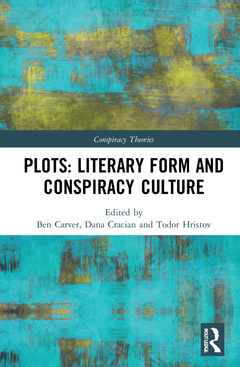Plots: Literary Form and Conspiracy Culture Conspiracy Theories Series

This edited collection contributes to the study of conspiracy culture by analysing the relationship of literary forms to the formation, reception, and transformation of conspiracy theories.
Conspiracy theories are narratives, and their narrative form provides the structure within which their ?readers? situate themselves when interpreting the world and its history. At the same time, conspiracist interpretations of the world may then be transmediated into works of literature and import popular discourse into narrative structures. The suppression and disappearance of books themselves may generate conspiracy theories and become co-opted into political dissent. Additionally, literary criticism itself is shown to adopt conspiracist modes of interpretation. By examining conspiracy plots as literary plots, with narrative, rhetorical, and symbolic characteristics, this volume is the first systematic study of how conspiracy culture in American and European history is the consequence of its interactions with literature.
This book will be of great interest to researchers of conspiracy theories, literature, and literary criticism.
Opening Considerations 1. Introduction 2. ‘Turning Points’: Plots and Conspiracy in Literature Section 1. Conspiracy Theories about Books and Authors 3. Erich Auerbach’s Conspiracy Theory 4. In Pursuit of Nationhood vis-à-vis Russia: The Search for Lost Manuscripts in Post-Soviet Countries 5. Conspiracy Reading: New Literary Perspectives on Paranoia in Thomas Pynchon Section 2. Plotting: Narrative Forms of Conspiracy 6. ‘The Cash Nexus’: Realism and Conspiracy in Balzac and Dickens 7. Conspiracy Narratives in Serialized Comics: An Exploration 8. Conspiracy Narratives and American Apocalypticism in The Turner Diaries Section 3. Fictional Disclosures: Conspiracy and the Politics of Truth 9. Suspicious Fictions: Fictionalising Acts in a Conspiracy Novel 10. Half-Truths: On an Instrument of Post-Truth Politics (and Conspiracy Narratives) 11. Men Make Their Own History: Conspiracy as Counter-narrative in the German Political Field
Ben Carver is a writing instructor at the European University Institute in Florence, Italy. He researches and writes about speculative literature. His publications study the hopes and fears of C19 alternate history, invasion and conspiracy fiction, and lost-world narratives.
Dana Craciun teaches 20th Century Literature and American Studies at the West University of Timișoara, Romania. Her other research interests include post-9/11 crises of representation, critical theory, and, more recently, conspiracy theories.
Todor Hristov teaches Critical Theory and Cultural Studies at the University of Sofia, Bulgaria. He is the author of books on conspiracy theories, literary theory, governmentality, social movements, and cultural studies, as well as articles on biopolitics, governmentality, critical political economy, and new social movements.
Date de parution : 05-2023
15.6x23.4 cm
Date de parution : 11-2021
15.6x23.4 cm
Thème de Plots: Literary Form and Conspiracy Culture :
Mots-clés :
Plots; Literary Form; Conspiracy; Auerbach; Pynchon; Balzac; Dickens; Comics; The Turner Diaries; Post-Truth Politics; Karatkevich; Khvylovy; Conspiracy Narratives; Young Man; Conspiracy Culture; Turner Diaries; Thomas Pynchon; West Germany; Retroactive Continuity; Oliver Stone’s JFK; Wolf Trap; Eva Horn; Adolf Hitler; Violating; Pynchon’s Fiction; Gravity’s Rainbow; UK Labour Party; Pynchon’s Work; Amazing Spider Man; Apocalyptic Narratives; Kyivan Rus; Figural Interpretation; Vulgar Novels; Incredible Hulk; Duchesse De Langeais



